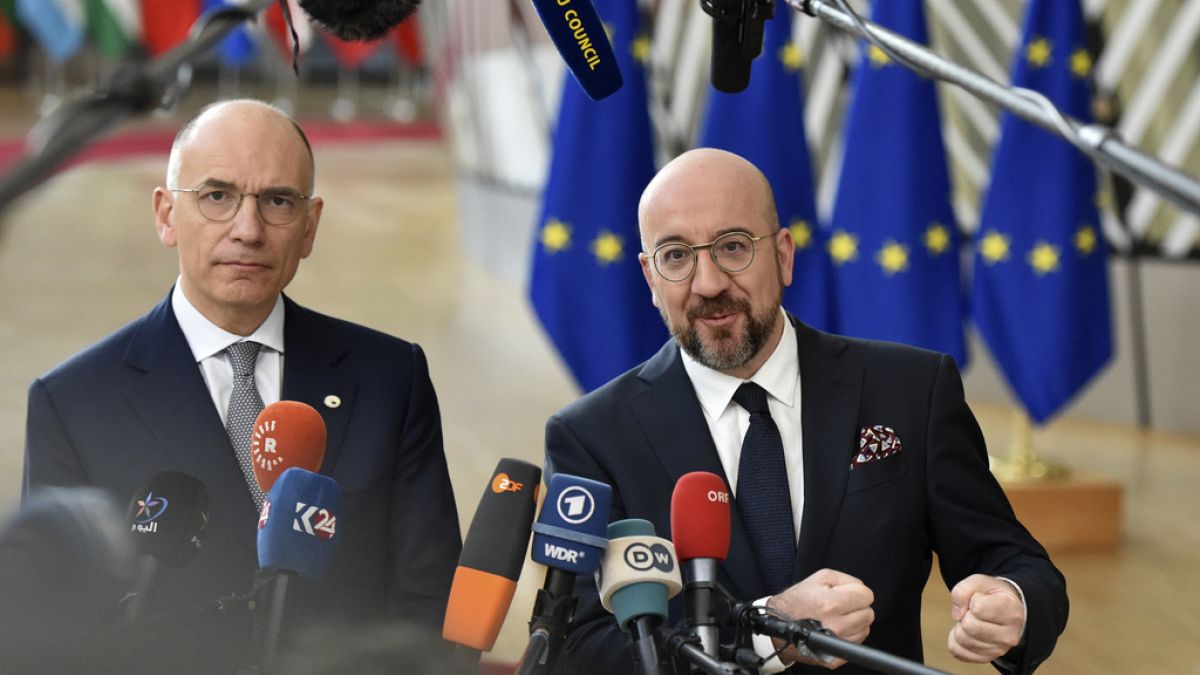Former Italian PM’s candidacy for European Council president could be Macron’s secret weapon in the struggle against Meloni’s bid for one of the EU’s top jobs in Brussels.
Never before in the Union’s history have the EU’s top institutional job appointments been the subject of such a thriller.
Yet, it’s hardly surprising, as the continent’s political environment has become extremely polarised, and the positions of many parties at the EU and national levels have become deeply radicalised.
The result is that an institutional key role entrusted to a rival could quickly turn into a political domino, affected by unpredictable systemic threats to the national and political interests of the actors involved in the perilous squid game of the EU grand appointments.
Inevitably, the never-ending rumble in Brussels between right-wing nationalist Italian Prime Minister Giorgia Meloni and liberal-democrat, pro-EU French President Emmanuel Macron has entered its “clash of civilisations” phase.
The move to propose former Italian PM Enrico Letta as the president of the European Council is set to become the main pillar of a firewall against the prospect of the far right’s institutional presence — and acceptance.
The right-wing’s surge at the last European elections and the concurrent shrinking of the pro-EU liberal forces of Renew Europe has shifted the balance of the EU to the right and destabilised the political arena in France and Germany.
The solution could be to entrust the Socialists and Democrats (S&D) with the EU Councils. For one, the S&D has not suffered humiliating defeats at the EU elections, unlike the liberals, and the Italian Democratic Party — which happens to be Letta’s party — is set to have the biggest delegations in the S&D group at the new European Parliament.
All this makes Letta a logical successor of the Belgian French-speaking liberal Charles Michel.
The June vote’s far-right success and Renaissance’s setback in France forced Macron to dissolve the French parliament and call a snap election to directly challenge Marine Le Pen’s heir apparent, Jordan Bardella, of ID’s National Rally.
‘Liaisons dangereuses’ and the wobbly Franco-German axis
The crucial French parliamentary electoral campaign is entangled with the EU’s top jobs negotiation, and the European political arena is deeply polarised.
The surge of the hard right in Europe has pushed their main stakeholders to demand key policymaking positions in the union.
Accepting the institutional elevation of a hard-right candidate at the EU level could become a de facto nod for the far right to gain key governmental roles in France.
The simple idea that a far-right prime minister like Meloni can ensure a top position for one of her candidates in Europe and the mainstream political parties’ increasing openness to the nationalist-right group in the European Parliament could certainly influence all of the 27 domestic political environments.
This is why other mainstream parties and governments in Europe are fully aware of the perspective of a normalised far-right.
Macron’s France, Chancellor Olaf Scholz’s Germany, PM Donald Tusk’s Poland and Prime Minister Pedro Sanchez’s Spain have so far set a political firewall to try and keep those further out to the right from scoring major EU appointments.
The “big four” represent the liberals, the moderate conservatives and the socialists — the three European political families of the outgoing grand coalition.
Tusk (EPP) holds significant interest in joining Macron’s crusade as his direct rival at home is the nationalist-right Law and Justice or PiS party, is a coalition partner of the Meloni’s Brothers of Italy in the ECR.
Scholz, a social democrat, has the same urgency to stop the far right as Macron since his party, the SPD, ended up being third behind the far-right AfD in the last European elections, won in Germany by the moderate conservatives of the CDU-CSU.
In Spain, Sanchez is struggling at home mostly against the centre-right PP, but also the far-right Vox. However, a staunch pro-EU socialist like Letta would be the perfect solution for the Spanish centre-left.
The four political leaders also share the priority of trying to soften the stances of Hungarian ultra-nationalist Prime Minister Viktor Orban — a task of significant importance, considering Hungary is about to take over the six-month rotating presidency of the European Council on 1 July.
According to this scenario, Letta could be the perfect solution for the pro-EU mainstream governments and the union’s parliamentary groups.
Who is Enrico Letta?
A former Italian prime minister, Letta has been in charge of putting together a high-level report on the future of the EU’s single market since 2023. He is also the president of the pro-EU Paris-based think tank, Institut Jaques Delors.*
His sudden withdrawal from the race to become the director of the prestigious Science Po University in Paris has given credit to the speculations about him warming up to the idea of a top job in the EU.
If his bid fails, Letta is also being mentioned as the next EU Special Envoy for the Middle East.
While Meloni might push back against Letta to advance her own goals, there seems to be no bad blood between the two, despite Letta being her main rival in the last Italian elections in 2022.
Judging by their recent interactions, Letta and Meloni’s personal relations are based on mutual respect and a rather cordial relationship regardless of their clear-cut political antagonism.
Over the last five years, ordinary mainstream political rivalries have turned into dead-or-alive antagonistic brawls, like the ongoing standoff between the centrist European Parliament grand coalition of EPP, S&D and Renew and the super-conservative block, a diverse landscape stretching from the nationalist-conservatives all the way to the far right.
Yet, the Parliament only has a limited amount of power, which is why other key institutional jobs matter so much at this time.
The institutional setup of the European Union grants the governments the prerogative to make crucial decisions. The European Parliament has the role of orienting and pacing some political actions but not imposing them.

